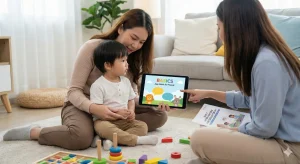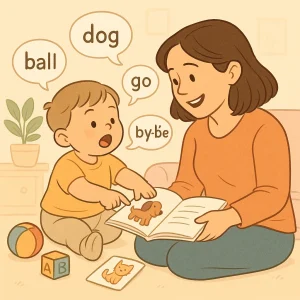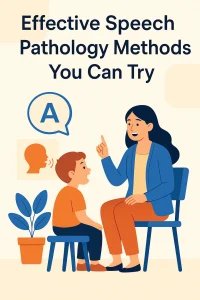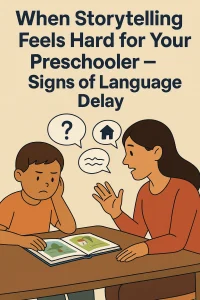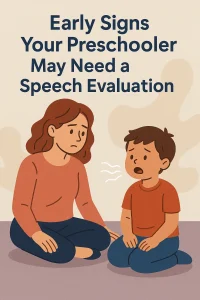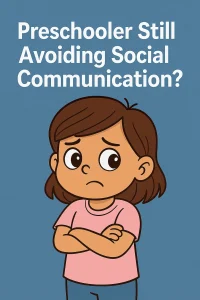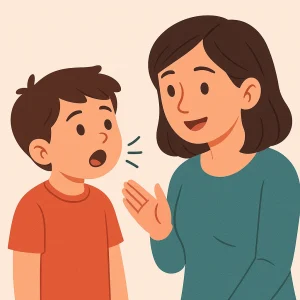Top Speech Therapy Exercises to Try at Home by Age
By Wellness Hub
Last Updated: October 22, 2024
Helping your child communicate better starts right at home! Speech therapy at home gives parents the power to actively support their child’s speech development through fun, structured exercises. Whether it’s toddlers learning their first words or older kids refining their speech clarity, these exercises are tailored to meet each age group’s specific needs. By practicing daily and engaging in targeted activities, parents can make a significant impact on their child’s language skills. Ready to dive in? Let’s explore the best exercises for every stage of development to boost speech therapy at home!
Read More: Speech Therapy at Home Exercises for Toddlers and Preschoolers
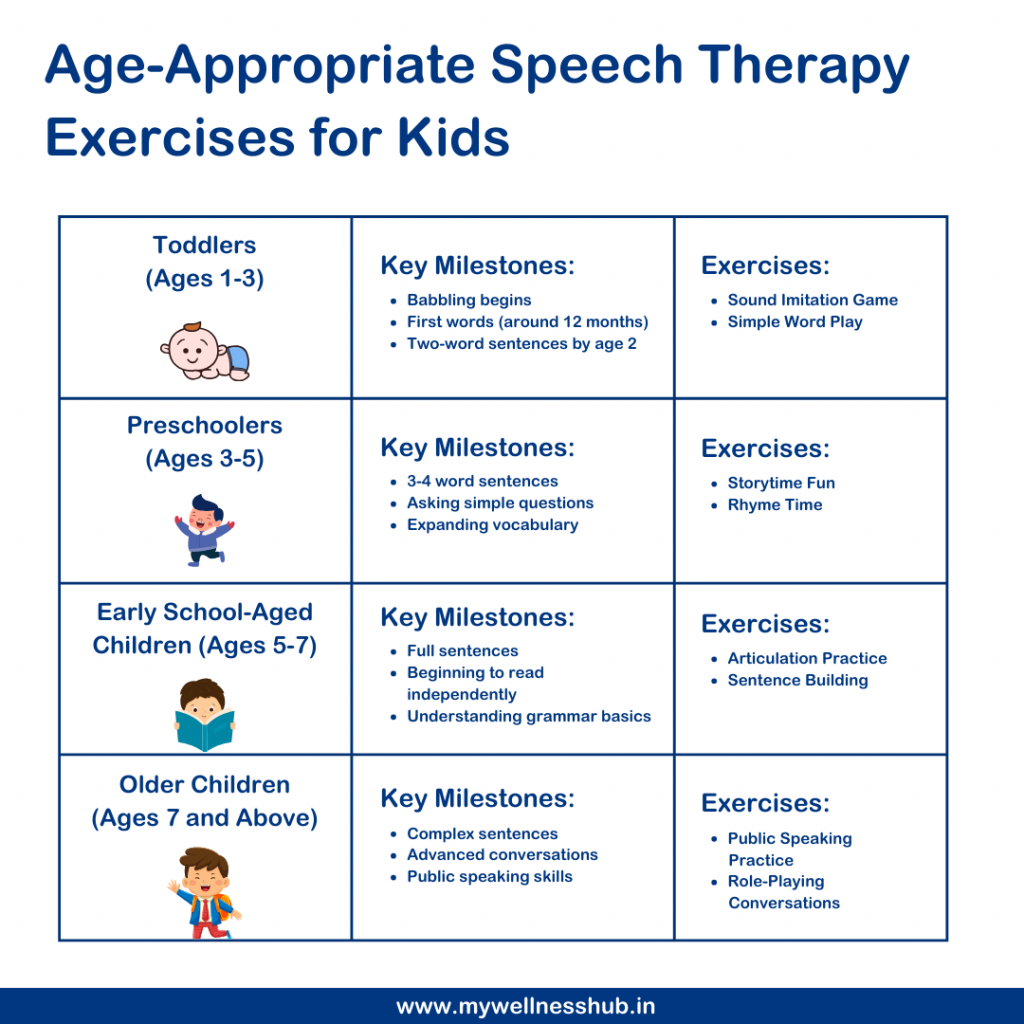
Speech Therapy for Toddlers (Ages 1-3)
Speech therapy at home is an essential tool for helping toddlers develop their speech and language skills. Parents and caregivers play a vital role in guiding their child’s early communication abilities. By understanding the key milestones and engaging in the right activities, you can help your toddler’s speech development thrive.
Early Speech Development Milestones
During the toddler years, children experience rapid growth in their speech and language skills. Between the ages of 1 and 3, many toddlers begin to:
- Babble and Experiment with Sounds: Around 12 months, most toddlers start babbling. They experiment with sounds, often repeating simple consonant-vowel combinations like “mama” or “dada.”
- Say First Words: By 12-18 months, many toddlers begin using their first real words. These may include names of familiar people, objects, or common phrases like “more” or “up.”
- Build Vocabulary: By age 2, toddlers often have a vocabulary of about 50 words and begin combining them into simple two-word sentences, like “more juice” or “big car.”
Recognizing Speech Delays Early
Parents should monitor their toddler’s speech development closely. If your child isn’t babbling by 12 months, using single words by 18 months, or combining words by age 2, it may signal a speech delay. Early intervention can make a big difference, so consult a speech therapist if you notice any of these signs.
Best Speech Therapy Exercises for Toddlers
Engaging in daily speech therapy exercises at home helps toddlers build strong language skills. These activities are easy to implement and can turn everyday interactions into learning opportunities:
- Imitation Games: Toddlers love to mimic their parents. You can make a game of copying each other’s sounds, words, or facial expressions. This encourages them to try new sounds and practice their speech.
- Sound Repetition: Repeating simple words or sounds like “ball,” “cat,” or “go” helps toddlers understand how words are formed. Make it fun by using toys or objects during playtime, encouraging them to repeat the words with you.
- Simple Wordplay: Engage your toddler by playing word games. You can point to familiar objects around the house and name them out loud. Encourage your child to repeat after you, slowly adding more objects and words.
- Sensory Play: Incorporate sensory play into speech therapy. Toys that stimulate multiple senses, such as musical toys, textured items, or colorful blocks, can grab your toddler’s attention while you introduce new words related to the objects they are playing with.
These exercises keep toddlers engaged while reinforcing their speech skills in a fun, natural way.
Read more: Creative Movement Exercises for Better Speech Development
How Parents Can Support Speech Development for Toddlers
Parents play a crucial role in their toddler’s speech journey. With consistent, focused effort, you can create a rich language environment that boosts your child’s speech development:
- Daily Practice: Incorporate speech exercises into your daily routine. Use simple words to describe activities as they happen—like “bath time,” “get dressed,” or “eat lunch.” Narrating these actions helps toddlers learn new vocabulary.
- Interactive Flashcards: Flashcards with pictures of animals, household items, or food can be a fun way to encourage speech. Point to a picture, say the word, and have your toddler repeat it back. Make it a game by offering praise and encouragement.
- Everyday Objects: Use items around your home to teach new words. While playing with a toy car, say, “car,” and ask your toddler to say it too. When they do, celebrate their success with positive reinforcement.
- Storytelling and Reading: Reading short, simple books to your toddler is one of the most effective ways to promote speech development. Point out pictures and ask your toddler questions like “What is this?” to engage them in conversation.
By consistently engaging in these practices, parents can create a speech-rich environment that encourages toddlers to develop their language skills naturally. Remember, the key is making it fun and interactive—toddlers learn best when they’re enjoying the process!
Also read: Speech Therapy at Home for Kids with Speech Delays
Speech Therapy for Preschoolers (Ages 3-5)
Preschool years are a critical time for speech and language development. At this age, children are rapidly expanding their vocabulary and forming sentences. Parents and caregivers play a key role in helping their child strengthen these skills with fun and interactive activities. Let’s explore the important milestones, signs of speech delays, and the best speech therapy exercises you can do at home.
Speech and Language Development in Preschoolers
By ages 3 to 5, your child should be able to form sentences with 3-4 words, ask simple questions, and express their needs and thoughts more clearly. They will likely show an interest in stories, follow simple instructions, and engage in conversations. Here are some key milestones to look out for:
- Forming simple sentences: Preschoolers start combining 3-4 words to express full ideas, such as “I want juice.”
- Asking questions: They begin asking basic “who,” “what,” and “where” questions, showing their growing curiosity.
- Understanding instructions: Children at this age should follow two-step directions, such as “Pick up your toy and put it on the shelf.”
Potential Signs of Speech Delay:
- Struggles to form sentences by age 4
- Limited vocabulary growth
- Difficulty following simple instructions
- Inconsistent or unclear speech
- Reluctance to engage in conversation
If you notice these signs, it may be time to introduce targeted speech therapy exercises at home. Consistent practice can help bridge the gap and support your child’s language development.
Best Speech Therapy Exercises for Preschoolers
Here’s a table of engaging speech therapy exercises that you can easily do with your preschooler at home:
| Exercise | Description | Benefits |
|---|---|---|
| Storytelling | Tell or read a simple story, then ask your child to retell it in their own words. | Improves memory, sentence structure, and vocabulary. |
| Rhyming Games | Play rhyming games like “cat-bat-hat.” Ask your child to find more rhyming words. | Enhances phonological awareness, an important skill for reading and speech development. |
| Vocabulary-Building Games | Use flashcards with pictures of objects and ask your child to name them. Add new words regularly. | Expands vocabulary and reinforces word-object association. |
| Reading Together | Read age-appropriate books and pause to ask questions like, “What do you think happens next?” | Encourages active listening, comprehension, and conversational skills. |
| Sing Along to Songs | Sing simple, repetitive songs and ask your child to join in. | Builds language rhythm and helps with speech clarity through repetition. |
Incorporating these exercises daily will provide a strong foundation for your child’s language skills. Remember, the more interactive the activity, the more engaged and interested your child will be.
Role of Play in Speech Therapy for Preschoolers
Play is one of the most effective ways to encourage language development in preschoolers. Children learn best when they are having fun, so incorporating play into speech therapy exercises keeps them motivated and engaged.
Role-playing games are especially helpful. You can use dolls, action figures, or everyday household objects to create scenarios where your child needs to use language to express themselves. For example, pretend you are at a restaurant, and ask your child to order food or describe what they want. This type of imaginative play encourages them to practice forming sentences and improves conversational skills.
Another fun approach is conversation-based games. You can ask your child questions about their favorite activities or let them play “teacher” where they explain something to you. These interactions give them a chance to practice new words, respond to questions, and gain confidence in speaking.
Speech Therapy for Early School-Aged Children (Ages 5-7)
When your child reaches the early school years, their speech and language skills take big leaps forward. This stage is crucial for mastering more complex aspects of communication, including grammar, vocabulary, and sentence structure. As a parent or caregiver, you play a key role in reinforcing these skills through fun and engaging speech therapy exercises at home.
Speech Development Milestones for Early School-Aged Children
By ages 5 to 7, children start using more complex sentences, often including several ideas within a single thought. They begin to grasp the rules of grammar and make fewer mistakes in tense and sentence structure. Their vocabulary also expands rapidly as they learn new words in school and through daily conversations.
At this stage, children can:
- Use complete sentences with multiple clauses.
- Understand and use different tenses correctly.
- Start conversations and follow along with longer discussions.
- Ask and answer detailed questions.
- Understand and use a growing number of vocabulary words.
These milestones are essential for their academic success and social interactions. Your role is to provide ongoing support through activities that encourage their language growth.
Best Speech Therapy Exercises for School-Aged Children
There are many effective and fun exercises you can do at home to improve your child’s speech and language skills. Focus on activities that make learning enjoyable while addressing any speech delays
Here are some top exercises:
- Articulation Games: Help your child practice tricky sounds through games. For example, create a treasure hunt where they must say words that begin with certain sounds to earn clues. Focus on any sounds they struggle with, like “s,” “r,” or “th.” Repetition is key, but make sure it stays fun!
- Sentence-Building Activities: Use sentence strips or flashcards with words on them. Ask your child to put them together to form sentences. This helps them practice sentence structure and boosts their creativity. For more advanced children, introduce vocabulary-building games where they must use newly learned words in sentences.
- Reading Aloud: Reading aloud together can improve speech clarity, pronunciation, and comprehension. Encourage your child to read stories out loud, and offer corrections gently when needed. Make it interactive—ask them to describe what’s happening in the story or predict what will happen next. This builds not only language skills but also critical thinking.
- Board Games and Puzzles: Structured language activities like board games and puzzles can also support language development. Games that require reading or verbal instructions are excellent for speech practice. Puzzles, meanwhile, encourage problem-solving and can be paired with discussion about the pieces or steps, further enhancing vocabulary.
How to Address Speech Clarity and Articulation Issues
Many children between ages 5 and 7 still struggle with speech clarity or articulation, especially with more complex sounds. Luckily, there are simple ways to help them improve their pronunciation.
Here are a few tips:
- Practice Specific Sounds: If your child has difficulty with certain sounds, break down the sound into smaller parts. For example, if they struggle with the “r” sound, have them start with simpler sounds like “l” and gradually work their way to forming “r.” Encourage them to use these sounds in fun words or sentences. Repetition helps these sounds stick.
- Model Correct Pronunciation: Speak clearly and emphasize the sounds your child struggles with. If they mispronounce a word, repeat it back correctly in a gentle, encouraging way. For example, if they say “wed” instead of “red,” you can say, “Oh, you mean the red ball? Great job playing with the red ball!”
- Use Mirrors: Watching their mouth in the mirror can help your child see how sounds are formed. This visual feedback helps them mimic the correct movements, especially for difficult sounds like “s” or “sh.”
- Break Words into Parts: For longer or more complex words, break them into smaller, more manageable parts. This makes it easier for your child to pronounce each part correctly before putting the whole word together.
- Positive Reinforcement: Celebrate your child’s successes, no matter how small. Positive reinforcement builds their confidence and encourages them to keep practicing.
General Tips for Effective Speech Therapy at Home
Speech therapy at home can be incredibly effective when approached with consistency, positivity, and the involvement of the whole family. As parents and caregivers, your role in creating a supportive environment is crucial to your child’s success. Below are some essential tips to ensure you make the most out of at-home speech therapy sessions.
Consistency and Positive Reinforcement in Speech Therapy
Consistency is key. Just like learning to walk, talk, or ride a bike, speech development takes time and regular practice. It’s important to incorporate speech therapy exercises into your child’s daily routine. This can be as simple as setting aside 10-15 minutes each day to focus on specific sounds or language skills. Consistent practice helps children build confidence, improves muscle memory, and encourages gradual speech development.
To make these sessions enjoyable and motivating, use positive reinforcement. Celebrate every small win, whether it’s mastering a new sound, saying a word clearly, or completing a task. This could be through verbal praise, a small reward, or even a fun activity they love. When children associate speech therapy with positive experiences, they’re more likely to stay engaged and enthusiastic about their progress.
How Family Involvement Improves Speech Therapy Outcomes
Family involvement is a game changer in speech therapy. Children learn best through interaction, and having siblings, grandparents, or other family members participate can make speech exercises more engaging. You can turn speech practice into a family game or storytelling session. Encourage siblings to get involved by playing speech-centered games that make practicing fun.
When family members model correct speech and language behaviors, children are more likely to imitate and practice those skills. For example, if you’re working on articulation, family members can emphasize clear speech during regular conversations. This integrated approach strengthens your child’s language skills in everyday settings, not just during designated therapy times.
When to Seek Professional Help
While home-based speech therapy can be effective, there may come a time when you notice that progress has stalled or certain milestones aren’t being met. If your child struggles with specific sounds, has trouble forming sentences, or exhibits frustration during practice, it’s important to consult a licensed speech therapist.
A professional can assess your child’s unique needs and provide tailored strategies to overcome challenges. Early intervention can make a significant difference, especially when addressing speech delays or articulation disorders. Always trust your instincts—if something feels off, seeking guidance from a professional ensures that your child receives the best possible care for their speech development.
Conclusion
Speech therapy at home doesn’t have to feel like a chore. By incorporating fun, age-specific exercises into your child’s daily routine, you can make learning engaging and enjoyable. Whether it’s imitating sounds with toddlers, reading stories with preschoolers, or improving articulation with school-aged kids, each activity plays a crucial role in their speech development journey. Remember, consistency is key! At Wellness Hub, we believe that empowering parents with the right tools and guidance can make all the difference. Together, let’s help your child thrive—one word at a time!
Frequently Asked Question
1. What is speech therapy at home, and how does it benefit my child?
Speech therapy at home involves engaging your child in exercises that improve speech and language skills. It allows parents to support their child’s development in a familiar environment and helps reinforce what they learn in therapy sessions.
2. How do I know if my child needs speech therapy at home?
If your child struggles with speech clarity, articulation, or is delayed in reaching speech and language milestones, incorporating speech therapy exercises at home can be highly beneficial. Consulting a speech therapist can help you determine if additional therapy is needed.
3. What are the best speech therapy exercises for toddlers?
For toddlers, the best exercises include simple sound imitation games, repeating basic words, and engaging them in sensory play that encourages speech, such as describing toys or actions.
4. How often should I practice speech therapy exercises with my child?
Consistency is key. Practicing speech therapy exercises daily, even for 10-15 minutes, can make a big difference in your child’s progress. Try to incorporate these activities naturally into your day-to-day routine.
5. Can speech therapy exercises help if my child is only slightly delayed?
Yes, even children with mild delays can benefit from regular speech therapy exercises at home. Early intervention is important to prevent further delays and boost your child’s communication skills.
How do I make speech therapy exercises fun for my child?
Use playful activities like singing songs, reading interactive books, and playing with toys to make speech therapy fun and engaging. Incorporating games into the exercises helps keep your child motivated.
At what age should I start speech therapy exercises at home?
You can begin speech therapy exercises as early as 12 months if you notice delays in sound production or verbal communication. However, it’s never too late to start working on speech therapy exercises, regardless of age.
What if I don’t see immediate progress in my child’s speech?
Speech development can take time, and progress varies from child to child. Be patient, stay consistent, and celebrate small wins. If you have concerns, consult a licensed speech therapist for professional guidance.
Can I use technology or apps for speech therapy at home?
Yes, there are many speech therapy apps and tools available that can support your child’s learning. However, it’s important to balance screen time with interactive and hands-on exercises for effective results.
When should I seek professional help from a speech therapist?
If your child shows no improvement after consistent at-home practice, or if their speech challenges significantly impact their ability to communicate, it’s advisable to seek professional help from a speech therapist for a thorough evaluation.
About the Author:
Shravanaveena Gajula
M.Sc ., Speech and Language Pathology (9+ years of experience)
Shravanaveena Gajula is a dedicated Audiologist and Speech-Language Pathologist with a BASLP and an M.Sc in Speech and Language Pathology. With experience spanning multiple settings, including Wellness Hub and Ashray Akruti, Veena specializes in a wide range of disorders from developmental issues in children to speech and language assessments in adults. Her expertise includes parent counseling, managing speech sound and fluency disorders, and creating individualized therapy programs. Veena is also PROMPT certified and an author of several insightful blogs on speech and language pathology, aiming to educate and assist caregivers in supporting their loved ones.
Book your Free Consultation Today
Parent/Caregiver Info:
Client’s Details:
* Error Message
